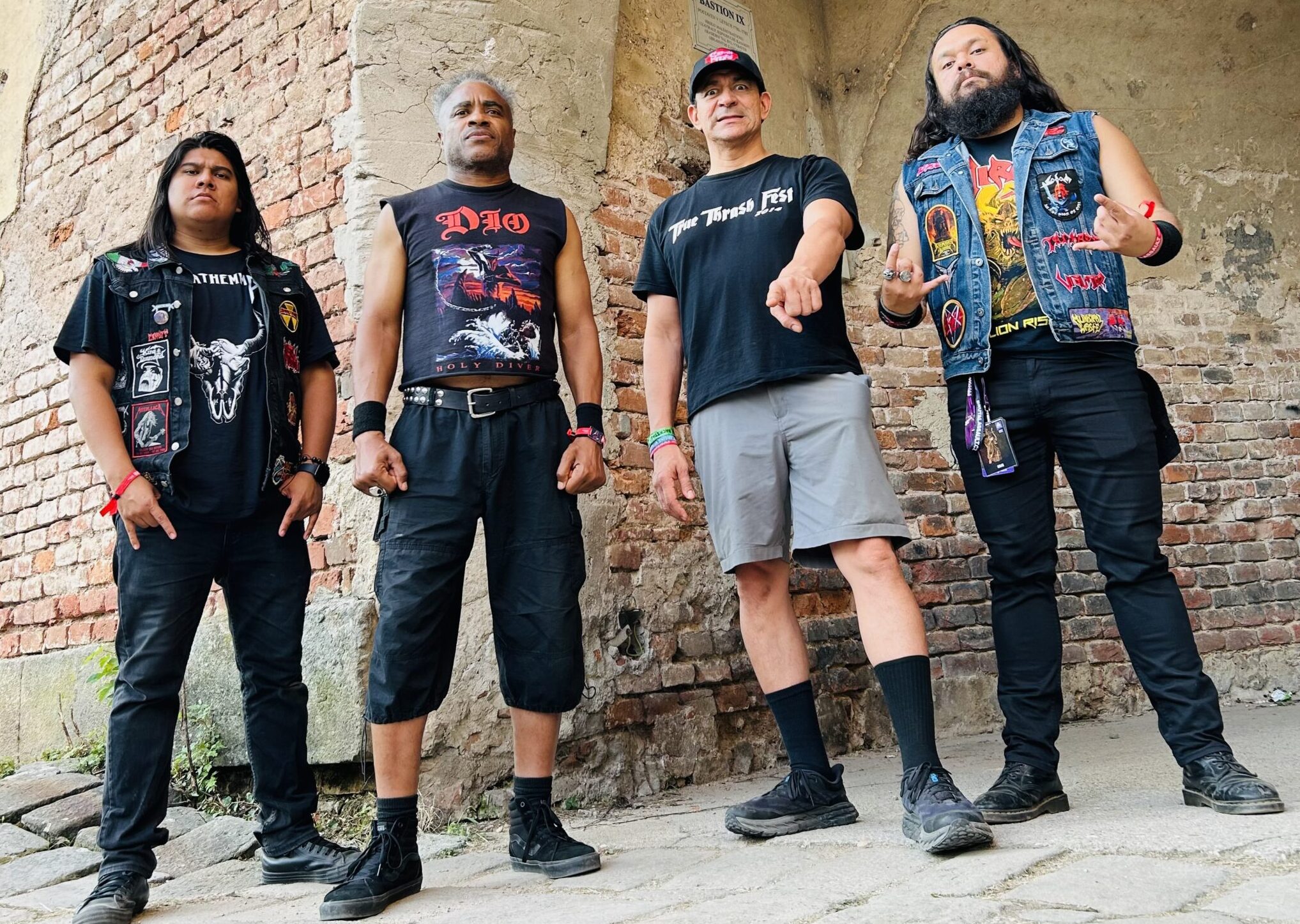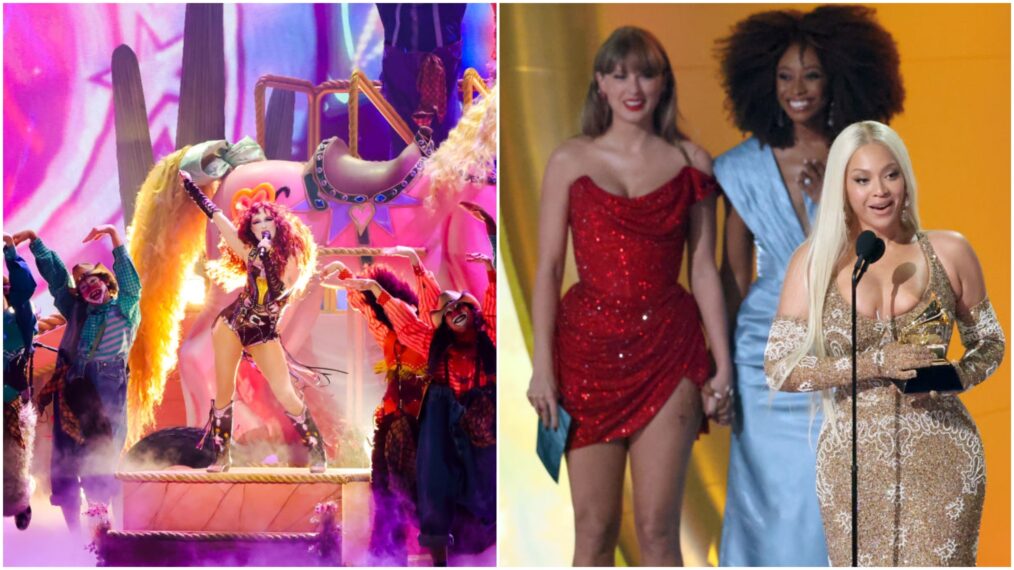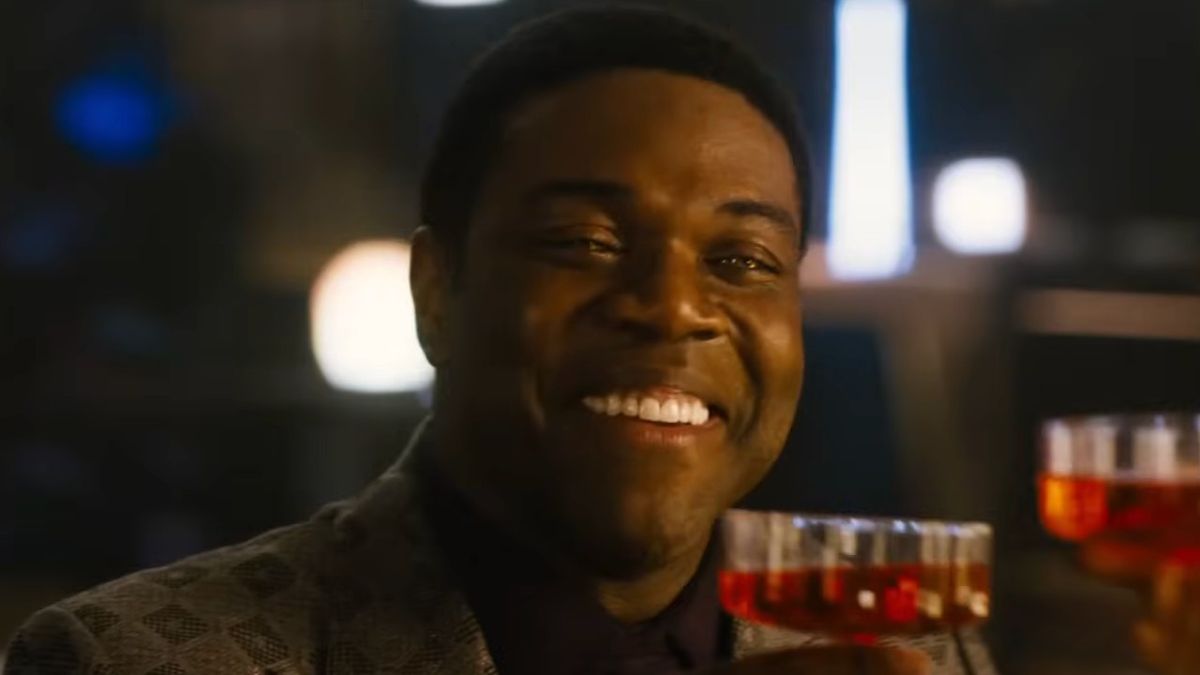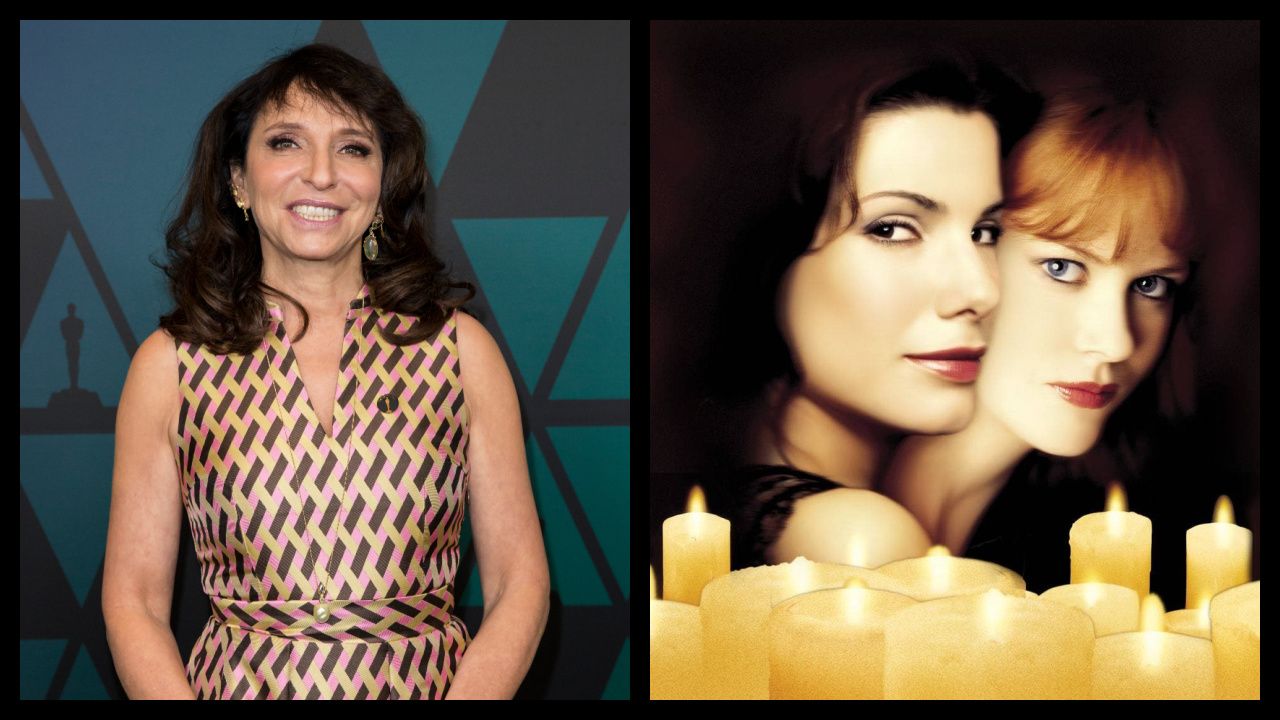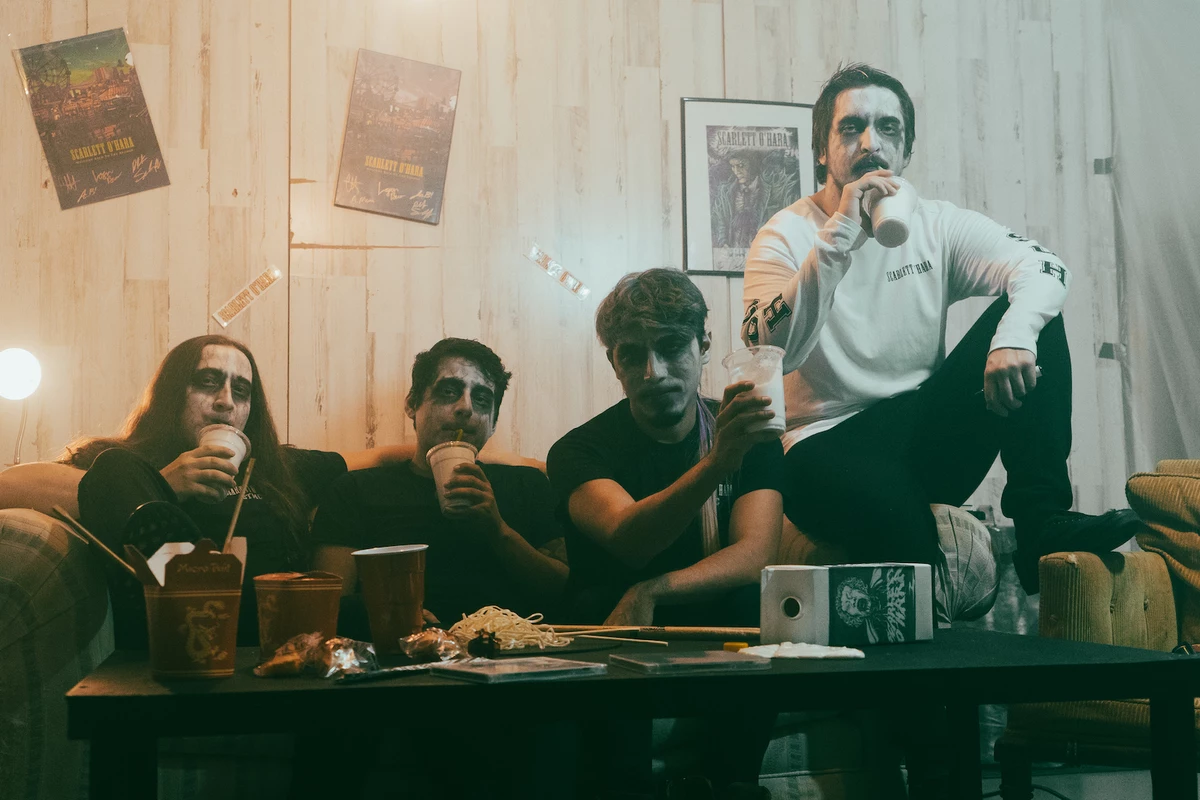
Moises Lopez Jr. is the singer for Scarlett O’Hara, an active rock band made up of Spanish-speaking Mexican Americans. Born in Weslaco, Texas, the 31-year-old vocalist is a first-generation Mexican American from his father’s side and also proudly represents the LGBTQ+ community as a gay hard rock frontman. The band originally formed in 2008 and helped spearhead a local subgenre known as “South Texas Metalcore.” In addition to Lopez Jr., Scarlett O’Hara features Arnie Bernal on drums, Logan Burns on the guitar and Alek Samodouroff on bass. Their 2021 singles “Friction” and “Obsessive” were both big successes for the group as they received a great deal of airplay on the radio and landed on several Billboard charts. Their latest single, “Witching Hour,” was released today — the video can be viewed below. Given his unique background and the topic of Scarlett O’Hara’s latest single “Witching Hour,” we asked Lopez to share his experience growing up as a minority trying to make it in rock music and why sharing songs focused on mental health is so important to him. Head below to see Lopez’s words, but first be sure to check out “Witching Hour.”
Scarlett O’Hara – ‘Witching Hour’
I came out of the closet while I was in high-school when I was 17 years old to my best friend and old bandmate at the time. I was incredibly nervous about it. Being gay was not something that was very common in our small city, let alone in a metal band. Despite that, I did feel ready to say it or at the very least to acknowledge that I had attractions toward the same sex and none to the opposite.
We were heading to Guitar Center, and I remember struggling to just come out and say it. My heart started to race so to ease my anxiety, I made it into a bit of a guessing game. His first guess was assuming I had a girl I was crushing on. I replied, “You are so far from the answer you could develop frostbite.” Once we bought our guitar strings we headed back to my house. That was when I took a deep breath and told him. My words were “I am not too sure about my sexuality, but I think I like guys. No, actually I know that I like guys.” At that moment he smiled at me and said, “Oh bro you’re fine, don’t even worry about it.” I didn’t really know how to react because it was not what I had braced myself for. He was very supportive about it, in fact all my bandmates and other school friends were to my shock.
I felt like one of the lucky ones, because my coming out was very smooth and easy even though the majority of my friends, if not all, were straight guys.
That being said, when it came to my family it was a bit different. My mother did not take my coming out well, but it wasn’t because she was upset that I was gay. She was more fearful for me and worried how the world would treat me. During her time, and most of our parents’ time, homosexuals were not treated very well and were sadly even killed for it. There was also the outbreak of HIV amongst gay men and she was worried about it, so I understood where she was coming from.
I never actually told my dad face to face. I was too scared. My sister ended up later telling me that he had a hunch after my then-boyfriend would come around often. She told him that she loves me no matter what. His response was “El es mi hijo de cualquier manera.” This means, he is my son either way.
From a young age, I think music was always something I dreamt of pursuing. I remember singing along to Selena songs while I was still in diapers. My parents used to be migrant workers, so I always attended different schools and was around a very diverse group of kids. I never originally wanted to be a frontman because I was shy of speaking but singers were difficult to come by in our area so I ended up watching YouTube videos on how to do it and I picked it up. The only gay icons in rock I knew of were Rob Halford and Freddie Mercury. Mind you, that is one hell of a bar for me to reach…no pressure!
Forgive me if I leave any notable ones out, but as far as Latinos in rock and metal (or at least the ones I knew about at the time) were Metallica’s bassist Robert Trujillo, Coheed and Cambria’s Claudio Sanchez and Pierce the Veil. Latinos in rock were not the majority of what I saw growing up. Not that I am complaining about it, but it is a fact that rock and metal were dominated by white men.
One of my idols when I first started singing was definitely Breaking Benjamin. Lead singer and guitarist Ben Burnley was that guy I wanted to be, but he looked absolutely nothing like me. He was this 6’4″ white guy, and I was this 5’5″ little Mexican teen that could not even grow a full beard. I do not really look like most of the guys in the top bands of today. I don’t know if things would be different if there were more people like me out there. However, I try to look at that in a positive way. I am the only one out there who looks like me and maybe that will inspire rock fans who look like me, too.
Both bands I’m currently in — The Sight Of Impact and Scarlett O’Hara — are amazing and I love them to death. They never had an issue with me being gay. I remember talking to Arnie, our drummer, and he said that Logan even gave them all a small talk before I joined them to make sure that they would not say anything that could possibly be hurtful to me due to my sexuality.
Currently, I don’t think LGBTQ or minorities are shunned from rock and metal, but I don’t think it’s really encouraging or promoting them to join either. I don’t think there are enough diverse people in the rock scene. That’s something I’ve discovered first-hand during my time in Scarlett O’Hara. I think improving that would be a huge step in the right direction for creative freedom. It would open our eyes to the many different approaches that people of different backgrounds can have toward the same genre of music by adding their unique flairs.
People of different backgrounds have individual perspectives to bring to the table, which is one reason why I think diversity is so important. You go into a Latino household, white, Black, Asian, Indian, etc., and I guarantee you they will all cook you a meal differently. I feel the same goes for rock music. Diversity leads to more learning because we get to understand our differences in our cultures. This leads to a larger variety of expressions in writing, in sounds, in performances and even in image. The more diverse styles of music and people we see, the more it can directly influence and inspire the music and performances of the present and future.
By having a more diverse group of people in music it says, “Hey that person did it, they struggled their way up there but did it. What’s your excuse?” It also opens us up to learning about other cultures through a shared love of music.
Also worth mentioning is the connection between this topic and mental health, which undoubtedly exists. I see how diversity, or lack thereof, could affect the mental health of a lot of rock musicians, regardless of race. It could quickly become a lonely world without the support of close friends and family.
When we made a post about me being a gay frontman, I was lucky that the response was very positive, but feeling different from your peers can still take a toll for many people.
The topic of mental health has been extremely prominent in our music since it is something I am constantly balancing. I wrote the lyrics for our new song “Witching Hour” based on a person who is being haunted by a ghost, spirit, demon, their own mind, whatever you will. This person is going crazy in trying to prove to others that they are being haunted but no one will believe them. So they turn to drugs or other abnormal tendencies in trying to cope with it.
The line “stop blaming the voices for all the bad choices” is me saying to adopt some responsibility and stop saying “Oh, I am doing bad things because I’m sick or going through stuff.” That’s not an excuse. Shit happens sometimes, but if you need help, seek it. There is no shame in that. I know a lot of Latino men especially can be incredibly stubborn when it comes to seeking help. The lyrics of many of our recent songs are meant to break that stigma.
If you or someone you know is struggling with mental health, help is available through the Substance Abuse and Mental Health Services Administration website. To speak to someone on the phone, dial 1-800-622-HELP (1-800-622-4357) or send a text message to 1-800-487-4889.
We all struggle with things on a daily basis. Some more than others. There is NO shame in seeking or needing help. Whenever I found myself at my lowest low I would tell myself “I can only go up from here.” My advice to Latino and LGBT youth is this: Do not think for a second that you can’t accomplish anything because of your skin or orientation. Work hard and you will learn to appreciate what you have more than those that are just simply handed things to them. Lastly, understand how to love and respect yourself.
As a band, we hope that we can be an example to others that it is okay to fully embrace who you are while also recognizing that it is okay to seek help for your mental health when you need it. Through our music and our actions in our daily lives, the goal is to be a realistic, attainable example of a Mexican American, openly gay frontman following in the footsteps of the ones before me.
Check out Scarlett O’Hara’s website to stay up to date with their upcoming releases.
















